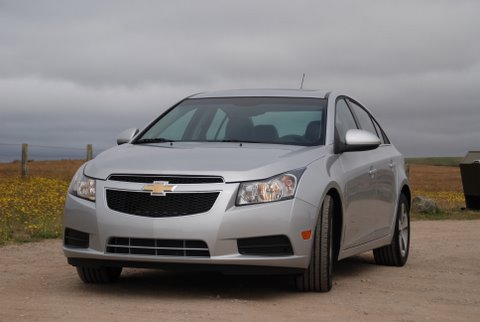 According to GMInsideNews.com, an independent website, General Motors will begin selling the Chevy Cruze with a diesel-engine option for the 2013 model year. It will be the company’s first diesel-powered passenger car in U.S. in decades. Workers at the Lordstown, Ohio, assembly plant where the Cruze is built were told about the diesel model last week (Feb. 15, 2010).
According to GMInsideNews.com, an independent website, General Motors will begin selling the Chevy Cruze with a diesel-engine option for the 2013 model year. It will be the company’s first diesel-powered passenger car in U.S. in decades. Workers at the Lordstown, Ohio, assembly plant where the Cruze is built were told about the diesel model last week (Feb. 15, 2010).
As news reports spread, GM officials quickly denied that this was part of their product plans, but their product chief Tom Stephens last year said the company was looking at adding a diesel engine to its passenger car line, so the story is consistent with those earlier pronouncements.
Because the Cruze is essentially the same car worldwide, GM could utilize its 2.0-liter diesel engine already sold in several markets. According to specs from Australia, where the diesel Cruze is currently sold, the model delivers 41 mpg with its 5-speed manual and 34 mpg with the 6-speed automatic—using the Australian test cycle. It’s too early to tell, but a U.S.-based diesel-powered Cruze could compete on efficiency with the current gas Chevy Cruze Eco manual (28 city and 42 highway)—while offering much better performance.
With well over 200 ft-lbs of torque (compared to less than 150 in the Cruze Eco), a model powered by a 2.0-liter turbodiesel could handily beat the performance of the 1.4-liter turbo gas in the Cruze Eco model, though at a likely cost premium of several thousand dollars. The key to the added cost will be the route GM takes to reduce diesel emissions in order to meet California standards and sell the model nationwide.
Think Global
Car companies are increasingly leveraging global assets to create common worldwide product portfolios. Toyota and Honda, as well as Ford and Nissan most recently, are using the best technology from their far-flung centers of expertise, bringing high-volume cost-savings along with the latest features. In Toyota's case, this has led to a global push for hybrid vehicles. Nissan is leading an all-electric campaign, and Ford is championing its EcoBoost engines as the most cost-effective path the building cars that consumers will want to buy.
With automakers planning an impressive roadmap of new efficient models, consumers will also have to expand their worldview by learning which alternative technologies best suit their driving needs. For example, while the Chevy Volt plug-in hybrid can deliver 40-mile jaunts using only electricity, a diesel-powered Cruze might be the better option for drivers who frequently drive long distances. With an expected 40+ mpg rating on the highway, and power delivered throughout the torque curve—and most importantly a price tag that’s significantly lower than the Volt—a diesel Cruze could be compelling.
Diesel vehicles are well established as the fuel-efficient choice for the European market and elsewhere in the world, while carmakers have primarily focused on hybrid gas-electric technology as the high-mpg strategy for Americans. The potential introduction of a diesel Cruze could help break this pattern—and pave the way for automakers to mix and match diesel and hybrid powertrains, with some plug-in models thrown into the mix.
The distinctions between efficient gasoline, diesel, electric and hybrids are blurring in one other way: also according to GMInsiderNews, the 2012 Cruze will be get a push-button start, a feature commonly associated with hybrid and electric cars in the U.S., but now migrating across product lines to increase fuel economy.
A slightly different version of this story first appeared in Hybridcars.com.
